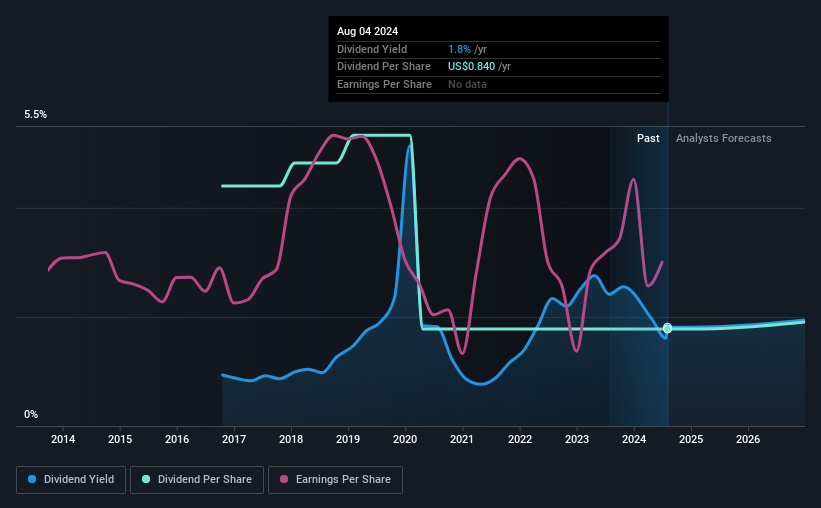CashNews.co
Readers hoping to buy Bread Financial Holdings, Inc. (NYSE:BFH) for its dividend will need to make their move shortly, as the stock is about to trade ex-dividend. The ex-dividend date is one business day before a company’s record date, which is the date on which the company determines which shareholders are entitled to receive a dividend. It is important to be aware of the ex-dividend date because any trade on the stock needs to have been settled on or before the record date. Meaning, you will need to purchase Bread Financial Holdings’ shares before the 9th of August to receive the dividend, which will be paid on the 13th of September.
The company’s next dividend payment will be US$0.21 per share, on the back of last year when the company paid a total of US$0.84 to shareholders. Last year’s total dividend payments show that Bread Financial Holdings has a trailing yield of 1.8% on the current share price of US$46.36. If you buy this business for its dividend, you should have an idea of whether Bread Financial Holdings’s dividend is reliable and sustainable. We need to see whether the dividend is covered by earnings and if it’s growing.
Check out our latest analysis for Bread Financial Holdings
If a company pays out more in dividends than it earned, then the dividend might become unsustainable – hardly an ideal situation. Bread Financial Holdings has a low and conservative payout ratio of just 8.5% of its income after tax.
When a company paid out less in dividends than it earned in profit, this generally suggests its dividend is affordable. The lower the % of its profit that it pays out, the greater the margin of safety for the dividend if the business enters a downturn.
Click here to see the company’s payout ratio, plus analyst estimates of its future dividends.


Have Earnings And Dividends Been Growing?
Businesses with shrinking earnings are tricky from a dividend perspective. If earnings decline and the company is forced to cut its dividend, investors could watch the value of their investment go up in smoke. Bread Financial Holdings’s earnings per share have fallen at approximately 11% a year over the previous five years. Such a sharp decline casts doubt on the future sustainability of the dividend.
Another key way to measure a company’s dividend prospects is by measuring its historical rate of dividend growth. Bread Financial Holdings’s dividend payments per share have declined at 11% per year on average over the past eight years, which is uninspiring. It’s never nice to see earnings and dividends falling, but at least management has cut the dividend rather than potentially risk the company’s health in an attempt to maintain it.
To Sum It Up
Should investors buy Bread Financial Holdings for the upcoming dividend? Bread Financial Holdings’s earnings per share are down over the past five years, although it has the cushion of a low payout ratio, which would suggest a cut to the dividend is relatively unlikely. We’re unconvinced on the company’s merits, and think there might be better opportunities out there.
However if you’re still interested in Bread Financial Holdings as a potential investment, you should definitely consider some of the risks involved with Bread Financial Holdings. For instance, we’ve identified 2 warning signs for Bread Financial Holdings (1 is potentially serious) you should be aware of.
Generally, we wouldn’t recommend just buying the first dividend stock you see. Here’s a curated list of interesting stocks that are strong dividend payers.
Have feedback on this article? Concerned about the content? Get in touch with us directly. Alternatively, email editorial-team (at) simplywallst.com.
This article by Simply Wall St is general in nature. We provide commentary based on historical data and analyst forecasts only using an unbiased methodology and our articles are not intended to be financial advice. It does not constitute a recommendation to buy or sell any stock, and does not take account of your objectives, or your financial situation. We aim to bring you long-term focused analysis driven by fundamental data. Note that our analysis may not factor in the latest price-sensitive company announcements or qualitative material. Simply Wall St has no position in any stocks mentioned.
Have feedback on this article? Concerned about the content? Get in touch with us directly. Alternatively, email [email protected]
#cashnews #UnitedStates #newsfinace #finance #FollowsCashnews
